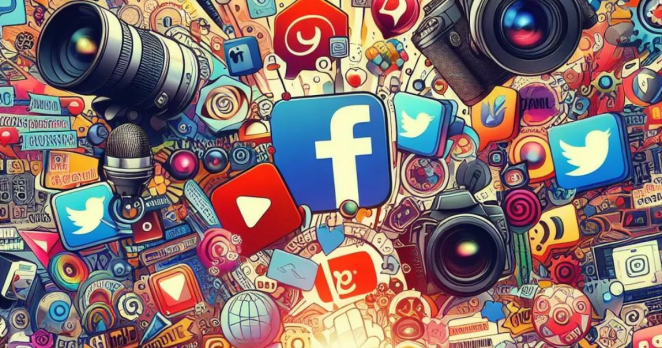The digital revolution is rapidly transforming the way we consume media, and the latest Ofcom report confirms a historic shift—online news consumption in the UK has officially overtaken television for the first time. This milestone is more than just a passing trend; it signals a fundamental change in how news is created, consumed, and trusted.
Thomas Walters, Europe CEO and co-founder of Billion Dollar Boy, offers valuable insight into what this change means for the future of media and the challenges it presents.
The Decline of Traditional Channels
“Like all media consumption, the news is increasingly transitioning away from linear channels to digital platforms," Walters begins. "We’ve seen it in the decline of print readership and TV viewership, coinciding with the rise in popularity of social media platforms like TikTok, which now has 1 billion monthly active users worldwide.”
For traditional news outlets, this shift poses a major challenge. Platforms like TikTok, YouTube, and Instagram cater to a generation used to bite-sized, on-the-go content.

Walters notes that social media’s preference for short-form video content contrasts with traditional news models that rely on scheduled broadcasts and longer, more in-depth reporting.
“Users like to consume bite-sized content while on the move," he says. "This cultural shift aligns with platforms like TikTok, which favor short videos over the more structured formats of traditional outlets like 1 o’clock news bulletins or daily print papers.”
Algorithms Over Editors
A key driver behind this shift is how content is delivered. Social media platforms rely on algorithms to tailor content specifically to users' interests, which offers a personalized, highly relevant news feed that differs significantly from the editorial curation of mainstream outlets.
“Consumers have become accustomed to receiving recommended content based on an algorithmic analysis of their preferences, rather than relying on the editorial judgment of mainstream news providers,” Walters explains. This means that for many users, social media platforms are not just convenient—they feel more relevant to their daily lives.
But while this personalization creates a more engaging experience, it also raises concerns. “On the face of it, there are benefits. News is becoming more fragmented and democratised, making it accessible to a broader audience,” he says. However, these benefits come with challenges, particularly around misinformation.
Misinformation and the Role of Social Media
The rise of news on social media has not been without its downsides. Walters points out that misinformation has found a fertile ground on these platforms, where content often spreads rapidly and is difficult to verify. The consequences are real and immediate, as seen in the recent far-right riots in the UK, where misinformation played a critical role.

“Although there isn’t necessarily a majority of users accessing social media specifically for news, many do consume news regularly from these platforms, despite knowing the risks of misinformation,” Walters notes. Alarmingly, a study found that two-thirds of US internet users are aware that social media is where fake news is most widespread, yet they continue to rely on these platforms for news content.
Changing Tides in Social Media
Adding to these concerns is the fact that some platforms are de-emphasizing or outright restricting news content. Meta, for instance, has moved to reduce the visibility of news on Facebook and Instagram feeds, and other platforms like X (formerly Twitter) and YouTube are cutting back on fact-checking and moderation.
Between 2022 and 2023, Walters points out, “Meta, X, and YouTube eliminated 17 policies designed to reduce hate speech, misinformation, and harassment.” This, coupled with the financial strain on traditional news outlets, has led to significant job losses in journalism. Walters highlights the concerning trend, noting that “some 528 journalists were laid off in January 2023 alone.”
Influencers as News Outlets?
Walters also discusses the rising influence of content creators who have, in some cases, become trusted news sources. "Creators like Dylan Page, aka News Daddy, have amassed millions of followers on platforms like TikTok," Walters says, noting that Page’s 12 million followers dwarf The New York Times’ 785,000 TikTok followers.
“Younger demographics increasingly trust these creators more than traditional outlets,” he continues. However, while influencers provide news in a peer-to-peer manner, they often lack the training of professional journalists, which raises issues of objectivity and accuracy. "The rise in creator-led short-video news content is largely unregulated, and these creators are not bound by the same journalistic standards," Walters cautions.
The Way Forward
Despite these challenges, Walters remains optimistic about the potential for digital platforms to engage mass audiences in current affairs. However, for this potential to be fully realized, better regulation of news on social media is crucial.

“If we can better regulate news and information on social media, we can harness its potential for engaging mass audiences,” Walters suggests. “Traditional news outlets will also need to adapt their models to embrace short-form video content and become social media-first in their approach.”
Final Thoughts
As online news continues to eclipse traditional forms of media, the industry must grapple with the twin challenges of misinformation and the decline of professional journalism. For Walters, the solution lies in striking a balance between embracing digital innovation and ensuring the integrity of news remains intact. Social media may be the future of news, but without regulation and adaptation, its potential risks overshadowing its benefits.







